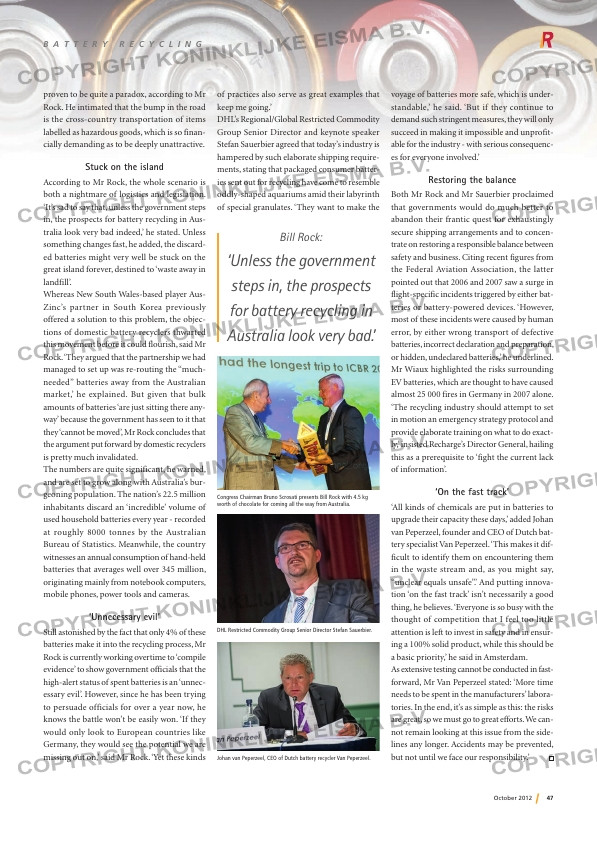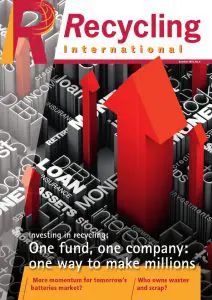Page 47 from: October 2012

47October 2012
B A T T E R Y R E C Y C L I N G
proven to be quite a paradox, according to Mr
Rock. He intimated that the bump in the road
is the cross-country transportation of items
labelled as hazardous goods, which is so finan-
cially demanding as to be deeply unattractive.
Stuck on the island
According to Mr Rock, the whole scenario is
both a nightmare of logistics and legislation.
‘It’s sad to say that, unless the government steps
in, the prospects for battery recycling in Aus-
tralia look very bad indeed,’ he stated. Unless
something changes fast, he added, the discard-
ed batteries might very well be stuck on the
great island forever, destined to ‘waste away in
landfill’.
Whereas New South Wales-based player Aus-
Zinc’s partner in South Korea previously
offered a solution to this problem, the objec-
tions of domestic battery recyclers thwarted
this movement before it could flourish, said Mr
Rock. ‘They argued that the partnership we had
managed to set up was re-routing the “much-
needed” batteries away from the Australian
market,’ he explained. But given that bulk
amounts of batteries ‘are just sitting there any-
way’ because the government has seen to it that
they ‘cannot be moved’, Mr Rock concludes that
the argument put forward by domestic recyclers
is pretty much invalidated.
The numbers are quite significant, he warned,
and are set to grow along with Australia’s bur-
geoning population. The nation’s 22.5 million
inhabitants discard an ‘incredible’ volume of
used household batteries every year – recorded
at roughly 8000 tonnes by the Australian
Bureau of Statistics. Meanwhile, the country
witnesses an annual consumption of hand-held
batteries that averages well over 345 million,
originating mainly from notebook computers,
mobile phones, power tools and cameras.
‘Unnecessary evil’
Still astonished by the fact that only 4% of these
batteries make it into the recycling process, Mr
Rock is currently working overtime to ‘compile
evidence’ to show government officials that the
high-alert status of spent batteries is an ‘unnec-
essary evil’. However, since he has been trying
to persuade officials for over a year now, he
knows the battle won’t be easily won. ‘If they
would only look to European countries like
Germany, they would see the potential we are
missing out on,’ said Mr Rock. ‘Yet these kinds
of practices also serve as great examples that
keep me going.’
DHL’s Regional/Global Restricted Commodity
Group Senior Director and keynote speaker
Stefan Sauerbier agreed that today’s industry is
hampered by such elaborate shipping require-
ments, stating that packaged consumer batter-
ies sent out for recycling have come to resemble
oddly-shaped aquariums amid their labyrinth
of special granulates. ‘They want to make the
voyage of batteries more safe, which is under-
standable,’ he said. ‘But if they continue to
demand such stringent measures, they will only
succeed in making it impossible and unprofit-
able for the industry – with serious consequenc-
es for everyone involved.’
Restoring the balance
Both Mr Rock and Mr Sauerbier proclaimed
that governments would do much better to
abandon their frantic quest for exhaustingly
secure shipping arrangements and to concen-
trate on restoring a responsible balance between
safety and business. Citing recent figures from
the Federal Aviation Association, the latter
pointed out that 2006 and 2007 saw a surge in
flight-specific incidents triggered by either bat-
teries or battery-powered devices. ‘However,
most of these incidents were caused by human
error, by either wrong transport of defective
batteries, incorrect declaration and preparation,
or hidden, undeclared batteries,’ he underlined.
Mr Wiaux highlighted the risks surrounding
EV batteries, which are thought to have caused
almost 25 000 fires in Germany in 2007 alone.
‘The recycling industry should attempt to set
in motion an emergency strategy protocol and
provide elaborate training on what to do exact-
ly,’ insisted Recharge’s Director General, hailing
this as a prerequisite to ‘fight the current lack
of information’.
‘On the fast track’
‘All kinds of chemicals are put in batteries to
upgrade their capacity these days,’ added Johan
van Peperzeel, founder and CEO of Dutch bat-
tery specialist Van Peperzeel. ‘This makes it dif-
ficult to identify them on encountering them
in the waste stream and, as you might say,
“unclear equals unsafe”.’ And putting innova-
tion ‘on the fast track’ isn’t necessarily a good
thing, he believes. ‘Everyone is so busy with the
thought of competition that I feel too little
attention is left to invest in safety and in ensur-
ing a 100% solid product, while this should be
a basic priority,’ he said in Amsterdam.
As extensive testing cannot be conducted in fast-
forward, Mr Van Peperzeel stated: ‘More time
needs to be spent in the manufacturers’ labora-
tories. In the end, it’s as simple as this: the risks
are great, so we must go to great efforts. We can-
not remain looking at this issue from the side-
lines any longer. Accidents may be prevented,
but not until we face our responsibility.’
Congress Chairman Bruno Scrosati presents Bill Rock with 4.5 kg
worth of chocolate for coming all the way from Australia.
DHL Restricted Commodity Group Senior Director Stefan Sauerbier.
Johan van Peperzeel, CEO of Dutch battery recycler Van Peperzeel.
Bill Rock:
‘Unless the government
steps in, the prospects
for battery recycling in
Australia look very bad.’
R _8- in .indd 7 09-10-12 11:



